You should check and bleed your radiators at least once per season, especially in the fall before winter heating begins. Look for signs like cold spots, strange noises, or inconsistent heating, which indicate trapped air. It's a good idea to do another check in early spring too. Regular maintenance helps keep your heating system running efficiently and can lower your energy bills. If you're curious about the best techniques for bleeding, there's more to discover.
Key insights
- Check radiators at least once per season for air trapping signs like cold spots or unusual noises.
- The best time to bleed is in the fall, before winter heating begins.
- Consider an additional check in early spring to address any air buildup.
- Regular checks can prevent larger issues and ensure consistent heating performance.
- Annual bleeding enhances radiator efficiency and prolongs heating system lifespan.
Understanding Radiator Bleeding
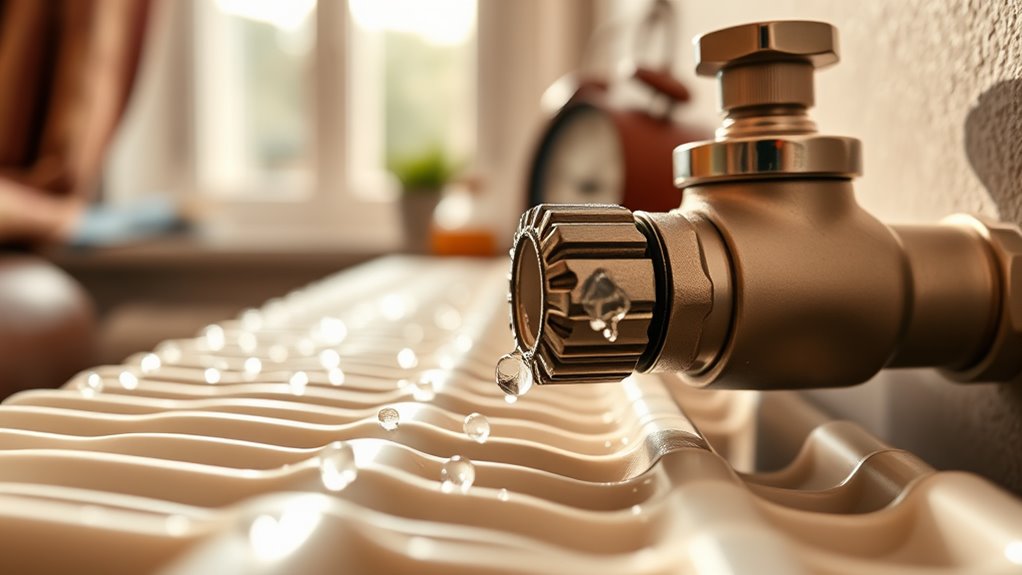
Understanding radiator bleeding is essential for maintaining an efficient heating system. When you bleed your radiators, you release trapped air, which can hinder effective air circulation. This trapped air creates cold spots, preventing your heating system from working effectively. By ensuring that your radiators are free of air pockets, you increase radiator efficiency, allowing them to distribute heat more evenly throughout your space. Regularly bleeding your radiators not only improves warmth but also reduces energy consumption, saving you money on your heating bills. Remember, a well-maintained radiator system contributes to a cozy environment and prolongs the lifespan of your heating equipment. Additionally, proper maintenance of your heating system can prevent costly breakdowns and ensure compliance with safety regulations. So, take the time to bleed your radiators and enjoy the benefits of a more efficient heating system.
Signs Your Radiators Need Bleeding
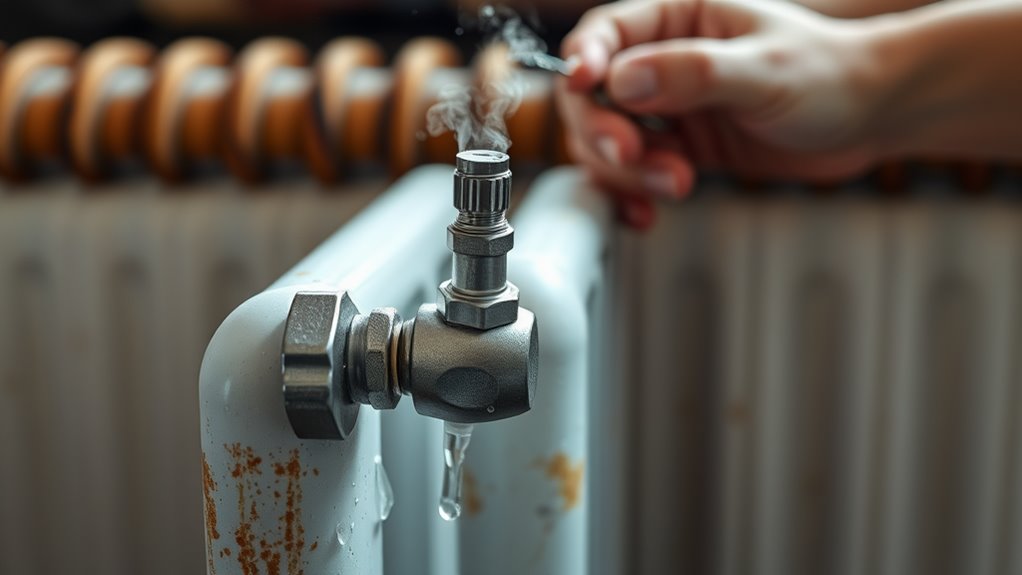
If you notice cold spots on your radiators, it's a sure sign they might need bleeding. Additionally, if your radiators are making unusual noises, like gurgling or clanking, it's time to take action. Keeping an eye out for these signs can help guarantee your heating system runs efficiently. Regular maintenance, including energy efficiency checks, can further enhance the performance of your heating system.
Cold Spots Detection
One clear sign your radiators need bleeding is the presence of cold spots. When you check your radiator temperature, you should feel an even warmth across the entire surface. If certain areas are noticeably cooler, that's a red flag. Cold spot identification is essential for maintaining efficient heating. These cold spots often indicate trapped air within the radiator, preventing hot water from circulating properly. To diagnose the issue, run your hand along the radiator; if you find cooler sections, it's time to bleed. Regularly checking for cold spots not only guarantees comfort but also enhances your heating system's efficiency. Additionally, addressing these cold spots can help prevent issues such as low water pressure that may lead to boiler error codes like E119. Don't ignore these signs—addressing cold spots promptly can save you on energy bills and improve your home's warmth.
Noisy Radiator Sounds
While enjoying a cozy evening at home, you might notice your radiator making unusual noises, which can be more than just an annoyance. These radiator noises often signal that it's time to bleed your radiators. If you hear gurgling, bubbling, or hissing sounds, it's usually trapped air causing the issue. Troubleshooting these sounds is essential; when air gets trapped, it prevents hot water from circulating properly, leading to inefficient heating. Ignoring these noises can result in higher energy bills and discomfort. So, if your radiator starts acting up, don't hesitate to bleed it. By releasing the trapped air, you'll restore proper function and enjoy a warm, peaceful home once more. Regular maintenance, including bleeding radiators, can help ensure efficient boiler operation and prevent recurring issues.
How Often Should You Check Your Radiators?
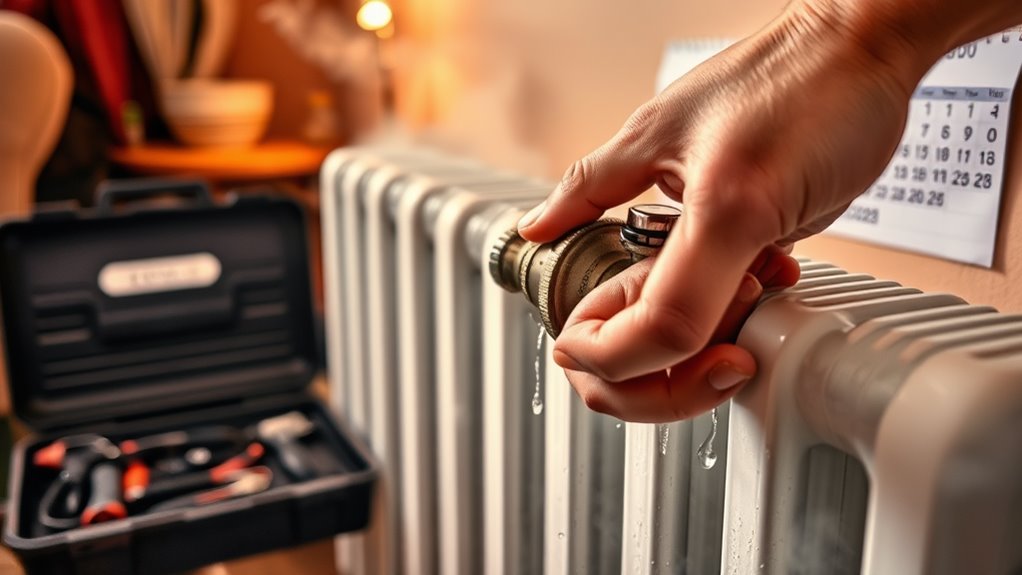
You should check your radiators at least once each season to guarantee they're working efficiently. Keep an eye out for signs of air trapping, like cold spots or unusual noises, as these can indicate the need for bleeding. Regular maintenance checks can save you from larger issues down the line. Additionally, regular inspections by qualified engineers can help identify issues early and prevent boiler error codes like E1.
Seasonal Maintenance Checks
Regular checks of your radiators are essential to verify they operate efficiently, especially as seasons change. As part of your seasonal preparation, you should include radiator inspections in your maintenance checklist. Ideally, inspect your radiators at the beginning of each season—before the cold months hit or as you prepare for warmer weather. Look for any visible signs of wear, leaks, or blockages. Ascertain that the valves function properly and that the system is free of dust and debris. Don't forget to bleed your radiators if you notice uneven heating. By staying proactive with these maintenance checks, you'll help extend the lifespan of your heating system and maintain a comfortable home environment year-round. Additionally, regular maintenance protects investments in equipment, keeping HVAC systems in optimal condition while reducing wear and tear.
Signs of Air Trapping
Noticing certain signs can help you determine when to check your radiators for air trapping. If you hear gurgling sounds or notice air bubbles in your radiator, it's time to take action. These noises often indicate that air is trapped within the system, preventing hot water from circulating effectively. You might also find cold spots on your radiator, especially at the top, which means your heating efficiency is compromised. If your home isn't warming up as it should, or if you feel uneven temperatures in different rooms, that's another sign to check for air in the system. Additionally, maintaining regular inspections can help prevent air trapping and ensure your heating system operates efficiently. By staying vigilant and addressing these issues promptly, you can maintain peak heating performance throughout your home.
The Best Time of Year to Bleed Your Radiators
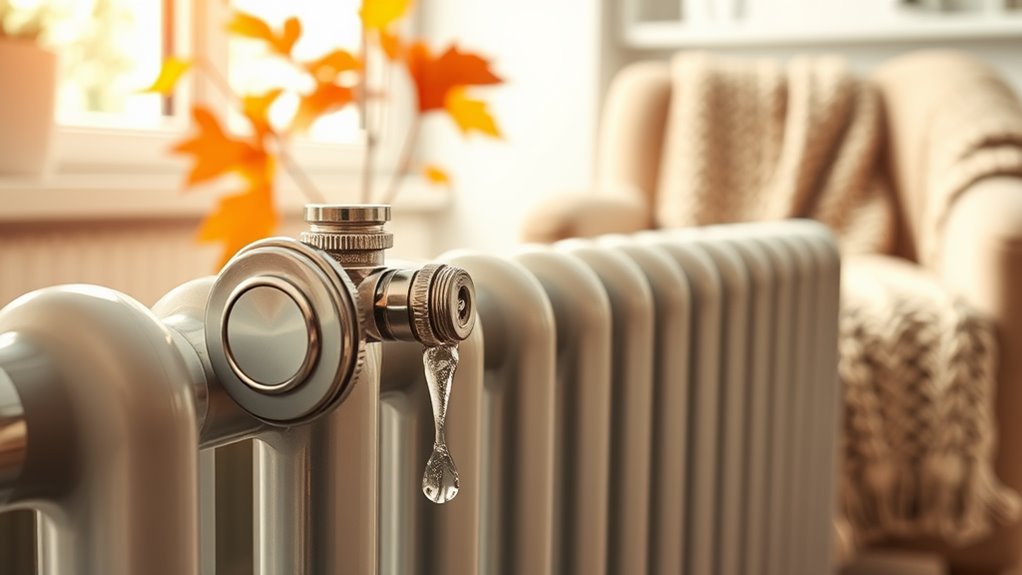
As the seasons change, it's important to reflect on when to bleed your radiators for ideal heating efficiency. The best time to tackle this task is during the fall, just before you switch on your heating system for the winter. This guarantees your radiators operate at peak performance when you need them most. It's also a good idea to check them again in early spring, as fluctuations during seasonal changes can lead to air buildup. Following these best practices not only enhances your comfort but can also prolong the life of your heating system. By being proactive, you can prevent cold spots and maintain a cozy atmosphere throughout the colder months. Regular maintenance is critical for peak boiler performance, ensuring your entire heating system functions smoothly throughout the year.
Steps to Bleed Your Radiators
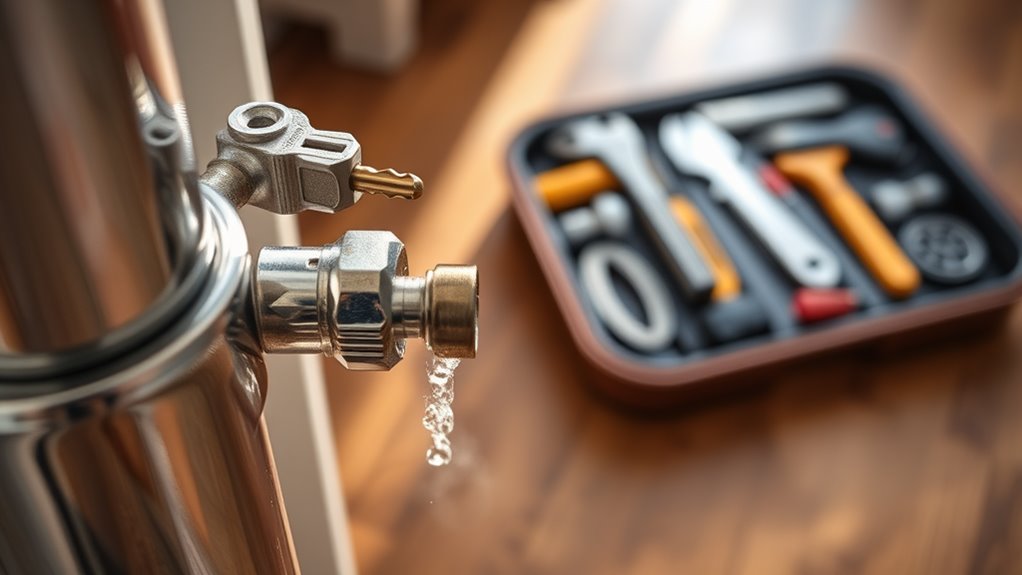
To bleed your radiators effectively, start by gathering the necessary tools: a radiator key, a cloth or towel, and a container to catch any water. Follow these steps for proper radiator maintenance and improved heating efficiency:
- Turn off your heating system. Confirm it's completely cool before starting.
- Insert the radiator key into the valve. Gently turn it counterclockwise until you hear a hissing sound, indicating trapped air is escaping.
- Catch any water with your cloth and container, and close the valve once the water flows steadily. Regular maintenance, including gas safety inspections, is essential to ensure your heating system operates efficiently and safely.
Tools You'll Need for Bleeding Radiators
When you're ready to bleed your radiators, having the right tools on hand is crucial for a smooth process. First, you'll need a radiator key, which is specifically designed for this task. Most radiators have a small valve that requires this key to open and release trapped air. Next, grab a cloth or towel to catch any water that may escape during the bleeding process. It's also helpful to have a small container handy to collect any excess water. If your radiators are particularly stubborn, a pair of pliers might come in handy as well. With these bleeding tools, you'll be well-prepared to tackle the task and guarantee your heating system runs efficiently. Regular maintenance, including checking for leaks, helps prevent issues with your heating system's performance.
Common Mistakes to Avoid
Have you ever found yourself frustrated after bleeding your radiators, only to realize you made some common mistakes? It's easy to fall for radiator myths and common misconceptions that can lead to ineffective bleeding. Here are three mistakes to avoid:
- Not Turning Off the Heating: Always turn off your heating system before you start. Bleeding hot radiators can cause burns and inefficiency.
- Skipping the Right Tools: Using incorrect tools can damage your radiator and prevent proper bleeding. Always have a radiator key handy.
- Ignoring the System Pressure: After bleeding, check the pressure gauge. Neglecting this can lead to further heating issues.
Maintaining Your Heating System for Optimal Performance
Maintaining your heating system is essential for guaranteeing peak performance and efficiency throughout the colder months. Regularly check your radiators for any signs of leaks or corrosion, as these issues can compromise radiator efficiency. Bleeding your radiators at least once a year helps release trapped air, allowing hot water to circulate effectively. Don't forget to inspect your boiler and verify it's running smoothly; this contributes to heating longevity. Cleaning your radiators and keeping them free from dust allows for better heat distribution. Finally, consider scheduling a professional service to catch any potential problems early, guaranteeing your heating system runs efficiently all winter long. Proper maintenance guarantees comfort and saves you money on energy bills.
Frequently Asked Questions
Can Bleeding Radiators Help Reduce Heating Bills?
Yes, bleeding your radiators can help reduce heating bills. When air traps in the system, it prevents hot water from circulating efficiently, leading to energy inefficiency. By releasing this trapped air, you improve your heating system's performance, resulting in cost savings over time. Regular maintenance, including bleeding, guarantees that your radiators work effectively, keeping your home warm without wasting energy. So, it's a smart move for both comfort and your wallet!
Is Bleeding Radiators a DIY Task or Should I Hire a Professional?
Bleeding radiators can be a straightforward DIY task if you're comfortable with basic tools. You'll find many DIY techniques online that guide you through the process, making it manageable. However, if you're unsure or have complex heating systems, hiring professional services might be a better option. They can guarantee everything's done correctly, preventing potential issues down the line. Ultimately, it depends on your skills and confidence in handling home maintenance tasks.
How Long Does the Radiator Bleeding Process Take?
Bleeding your radiators typically takes about 10 to 15 minutes per radiator, depending on your familiarity with radiator maintenance. You'll need a radiator key, a towel, and a container for any water that escapes. It's a straightforward process, but if you find air pockets often, you might consider adjusting the bleeding frequency. Regular maintenance helps guarantee your heating system runs efficiently, so don't hesitate to make it a part of your routine!
What if My Radiator Still Doesn't Heat After Bleeding?
If your radiator still doesn't heat after bleeding, don't worry—you can troubleshoot the issue. First, check the thermostat setting; it should be set higher than the current room temperature. Next, inspect the radiator valves for blockages or leaks. Finally, make certain your heating system is functioning correctly. Regular radiator maintenance can prevent these issues, so consider scheduling a professional check-up if problems persist. Keeping your system in top shape goes a long way!
Can Bleeding Radiators Cause Any Damage to the Heating System?
Bleeding your radiators is generally safe and shouldn't cause damage to your heating system when done correctly. In fact, proper radiator maintenance can enhance heating efficiency by removing trapped air. Just make certain to follow the right steps—turn off your heating, use a radiator key, and have a cloth handy for any water spills. If you're unsure, consulting a professional can help guarantee your system remains in good condition.
Summary
To summarize, regularly bleeding your radiators is key to maintaining an efficient heating system. By checking them at least once a year, ideally before winter, you can guarantee they're running smoothly. Remember to use the right tools and follow the steps carefully to avoid common mistakes. With a little attention, you'll enjoy a cozy, warm home while optimizing your heating performance. Don't overlook this simple task—it's essential for your comfort and your system's longevity!

